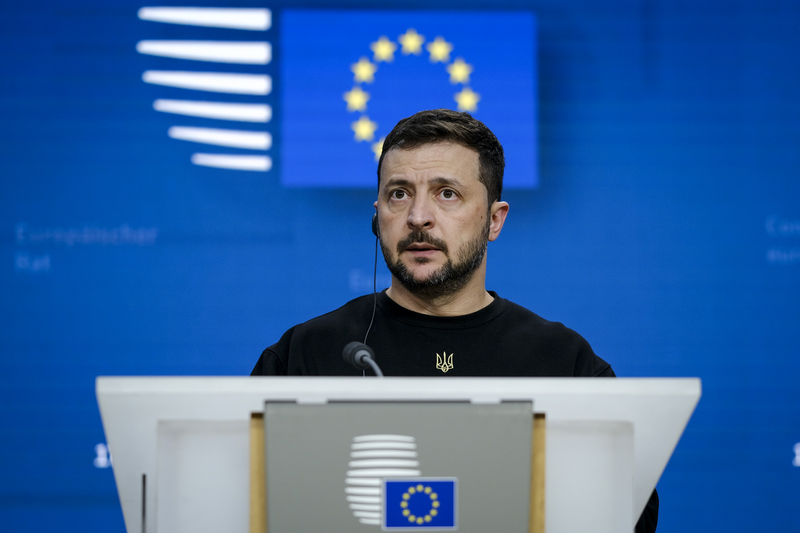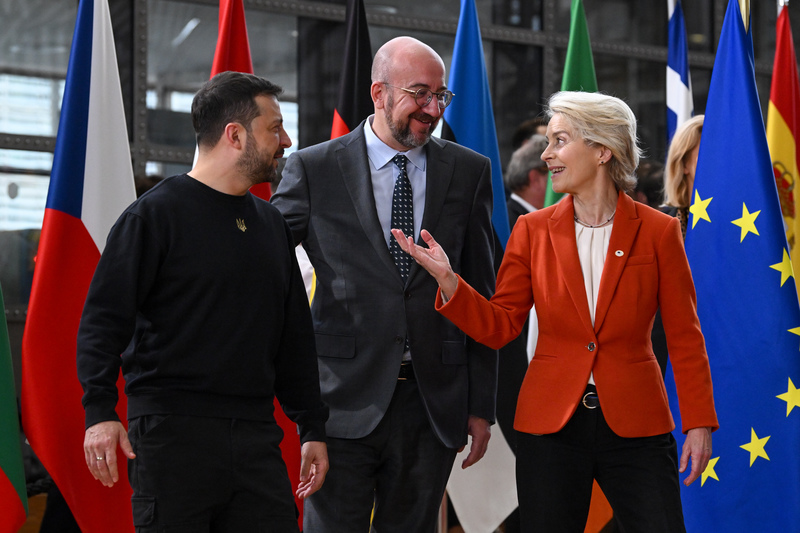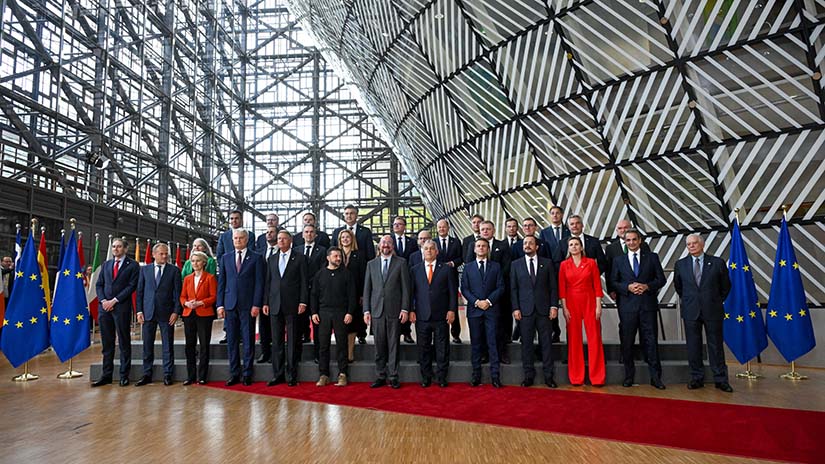The European Council meeting in Brussels on 17 October was dominated by the wars in Ukraine and in the Middle East with EU leaders adopting conclusions without taking any new decisions. Among specific foreign policy issues, the situation in Sudan was also discussed.
Ahead of the Council meeting, EU leaders and leaders from the six Gulf countries met in the first EU-Gulf Cooperation Council (GCC) summit. The GCC consists of the United Arab Emirates, Bahrain, Saudi Arabia, Oman, Qatar and Kuwait. The summit was described as an opportunity for the EU to develop a closer geostrategic partnership with the Gulf countries.
Joint statement with Gulf countries
The summit resulted in a joint statement which also covered the main foreign affairs issues on the European Council’s agenda. An EU diplomat described on Wednesday the GCC as “a tough nut to crack”. It was not easy to agree on the statement because the GCC is more divided than the EU. It was also reluctant to condemn Russia and Iran or even mention them by name.
After intensive negotiations, the EU and the GCC agreed on recalling a UN General Assembly resolution from March 2022 which “deplores in the strongest terms the aggression by Russia against Ukraine” in violation of UN Charter. But the issue of sanctions against Russia was not raised.
On Iran, the statement was even softer because the GCC countries are eager to engage in dialogue with its new president who is considered to be moderate. EU and GCC leaders stressed the importance of diplomatic engagement with Iran to pursue regional de-escalation. That said, they also “share a clear determination that Iran must never develop or acquire a nuclear weapon”.
Until now the EU has focused on “critical engagement” with Iran. Recently the EU has started to realize that its policy of limited sanctions (restricted measures) against Iran is not effective. A high-ranking EU official said at a recent briefing that High Representative Josep Borrell was misled by the new Iranian foreign minister, who had denied that Iran was delivering ballistic missiles to Russia.
The EU and GCC also discussed the civil war and humanitarian crisis in Sudan but the issue of weapons deliveries from Gulf countries fueling the war was not mentioned in the joint statement. The leaders stressed that there can be no military solution to the conflict in Sudan and reiterated their strong support for lasting peace and justice in Sudan.
Russia’s war of aggression
The European Council held an exchange of views with the President of Ukraine Volodymyr Zelenskyy. EU leaders addressed Russia’s war in all its dimensions and reaffirmed the EU’s continued support for Ukraine and its people. They reiterated their support for a comprehensive, just and lasting peace, in line with the UN charter and Ukraine’s peace formula.
They stressed that no initiative about Ukraine can be taken without Ukraine. It reconfirmed the EU’s “unwavering commitment to providing continued political, financial, economic, humanitarian, military and diplomatic support to Ukraine and its people for as long as it takes and as intensely as needed. Russia must not prevail.”
EU leaders also reviewed progress on military support for Ukraine and called for rapid stepping up and accelerating the delivery of air defence systems, ammunition and missiles, which are urgently needed to protect Ukraine’s population and its critical energy infrastructure.
The Council called to swiftly finalise work on the European Peace Facility assistance measures. Until now, an agreement on the reimbursement of EU Member States for their military support to Ukraine has been blocked by Hungary. Russia’s assets should remain immobilised until Russia ceases its war against Ukraine and compensates it for the damage caused by this war.
The circumvention of EU sanctions against Russia is still a problem and the EU strongly condemned third countries’ continued support for Russia. This includes not only direct military support (by Iran) but also the provision of dual-use goods and sensitive items that sustain Russia’s military industrial base (by China). North Korea has reportedly sent soldiers and military experts to support Russia.
The EU has responded to this threat to European and global security, including with a package of new restrictive measures against Iran, which includes the designation of individuals and entities involved with Iran’s ballistic missile and drone programmes. But it has not imposed combined sanctions on Iran for its weapons deliveries to both Russia and its proxies in the Middle East (see below).

Ukraine's President Volodymyr Zelenskyy at the press conference, 17 October, credit: EU
Ukraine’s “victory plan” was discussed at the Council but not mentioned in the conclusions. Asked at the press conference about EU’s support for it, Zelenskyy replied that 18 Member States had commented on it in closed talks with Ukraine, with a majority supporting it. “The first point in the plan is a request to NATO to strengthen our people by assurances about NATO membership,” he said.
“We need to feel that we aren’t alone. Being in NATO is a security umbrella.” Zelenskyy regards NATO membership as only fair to Ukraine after it gave up its nuclear arsenal in the Budapest Memorandum in 1994 in exchange for security guaranties for its sovereignty and territorial integrity. Those guarantees were violated by Russia. “NATO membership is a preventive step,” he explained.
Weapons and investments in Ukraine are also important parts of the victory plan. “We must prevent Russia from capturing our raw materials. It will be extremely difficult for us without more support and it will only benefit Russia. A strong Ukraine has the possibility to stop Russia if it refuses to stop the war.” Ukraine should be strong and negotiate from a strong position at next peace summit.
The situation in the Middle East
The wording on the situation in the Middle East was more “delicate” according to the EU diplomat and the EU took in the beginning a “prudent” approach on Iran. However, in the final conclusions on Thursday evening, the EU condemned “in the strongest terms the Iranian attack on Israel on 1 October and Iran’s seriously destabilising actions throughout the Middle East” through it proxies.
The EU also reiterated Israel’s right to defend itself in line with international law and the EU’s commitment to its security and to regional stability. Rocket attacks by Hezbollah from Lebanon must stop. Lebanon’s sovereignty and territorial integrity must be respected.
The council also repeated a statement by High Representative Borrell on behalf of the EU on the attacks against UN troops (UNIFIL) in southern Lebanon. In the statement, he implied that the attacks, that left several peacekeepers wounded, had been deliberate. Israel claimed that the UN soldiers had been accidently hit in the cross-fire with Hezbollah, which has established positions close to the UN base.
EU Member States were concerned about the incident because 16 of them are contributing to the UN force, ranging from a few soldiers to several hundred (Italy, France, Spain, Poland). The force is under the command of a Spanish general.
Speaking at a press conference after the foreign affairs council, Borrell was not sure that the attack against UNIFIL had been deliberate but insisted that “they cannot be justified by any kind of incident or accident”. His spokesperson explained that he did not have to convince the Member States because they had access to their own information.
On Saturday, at the margins of a meeting of the G7 defense ministers in Naples, Borrell said that the mandate of UNIFIL is not an executive mandate. “What do I mean by that? If UNIFIL is patrolling and they discover a rocket launcher of Hezbollah, what do they have to do? What they have to do, is to call the Lebanese army and to warn them and ask them to go and act.”
In fact, that did not work and UNIFIL failed in its “stabilizing role”. It hardly reported anything and turned a blind eye to Hezbollah’s military build-up close to the border with Israel, in violation of UN Security Council Resolution 1701 from 2006. Does the EU hold Lebanon responsible for Hezbollah’s attacks against Israel and for allowing it to act as proxy for Iran from its territory?
“There is no common EU position saying that the EU is holding Lebanon responsible for what Hezbollah does,” the EU spokesperson replied. “The EU statements are condemning Hezbollah for its attacks and for not respecting the UN resolution.” He did not elaborate on how to stop the attacks and help Lebanon to regain control over its territory.
“We don’t give up,” European Council Charles Michel said at the press conference after the Council meeting. “We have acted for months for a ceasefire in Gaza and Lebanon. He added that the EU has a serious problem with the role played by Iran. “We can see that it’s a nuclear threat, that it doesn’t accept the existence of Israel. We cannot accept its behavior and use of proxies to destabilize the region.”

Zelenskyy, Michel and von der Leyen, credit:
Possible turning point
The news about the killing of Yahya Sinwar, the Hamas leader in Hamas, reached the Council just before it finalized the conclusions. Asked about their comments, the EU leaders did not mourn his death. Charles Michel noted that Sinwar had been responsible for the 7 October terrorist attack and for the suffering of the Palestinian people in Gaza.
His death could become a turning point in the war if it would result in a ceasefire – hostage deal in Gaza and open a new perspective for a solution in Lebanon. Hamas as a military force is already defeated in Gaza. It could be removed from power if the Israeli government would agree to allowing an alternative in the form of a reformed Palestinian Authority and an international force in a post-Hamas Gaza.
An increase in humanitarian assistance is urgent, so is also the rebuilding of Gaza. But the rebuilding, which will take years, can only start if the war ends and international donors are convinced that what is going to be built up will not be destroyed again. For this to happen, there must be a political perspective towards the two-state solution of the Israeli-Palestinian conflict “the day after”.
In Lebanon, the EU would have to consider the Iran-armed Hezbollah as its own problem and a threat to both Israel and Lebanon. Without a diplomatic solution combined with fundamental reforms in Lebanon, effectively disarming Hezbollah, the war between Israel and Hezbollah will continue to drag on and devastate both countries. “In the Middle East, Lebanon is at this moment the most important and pressing issue,” Borrell said yesterday.
M. Apelblat
The Brussels Times

